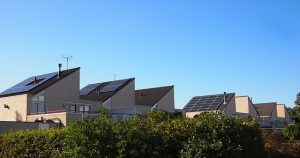
Another step towards an integrated home energy offering –…
SolarCity has just announced another important collaboration in the home energy space – this time Nest Labs – this time offering a Nest thermostat for 10,000 new customers at no additional cost. Importantly, the announcement indicates that a common technology framework or platform is emerging that will integrate and address both home energy management as well as home solar generation. Such a standardized technology framework is critical in order to maximize the capture of potential benefits from energy efficiency and localized renewable power generation, as well as ensure that home energy technologies are simple and usable enough for the consumer market.
It is clear that a powerful integrated home energy offering is emerging combing energy efficiency and data analytics from Nest and Google with local solar generation and local energy storage from SolarCity and Tesla. This alliance of aggressive and disruptive market leaders will be a force to be reckoned with – posing a risk to established utilities as well as to emerging cleantech start-ups in the home energy space. There seems to be a clear ambition to rapidly grow their offerings in a race to grab market share. As home energy agreements typically last in the order of 20 years, it will be difficult to compete let along displace the early market leaders. Combined with the fact that many smart energy and smart home technologies from home battery packs to connected appliances are only just beginning to address the mass market, this alliance will be ideally positioned to benefit from the emerging trends of the internet of things and home connectivity as well as localized renewable power generation.
For consumers the value proposition will be powerful – reduced utility bills, lower environmental impact and an integrated and simplified interface for managing home energy. A 20 year commitment will seem like a reasonable trade-off and so expect strong participation from the market and that the offer will be extended and expanded before the end of the year. For interested users the only downside is that the offer is currently only available in California.